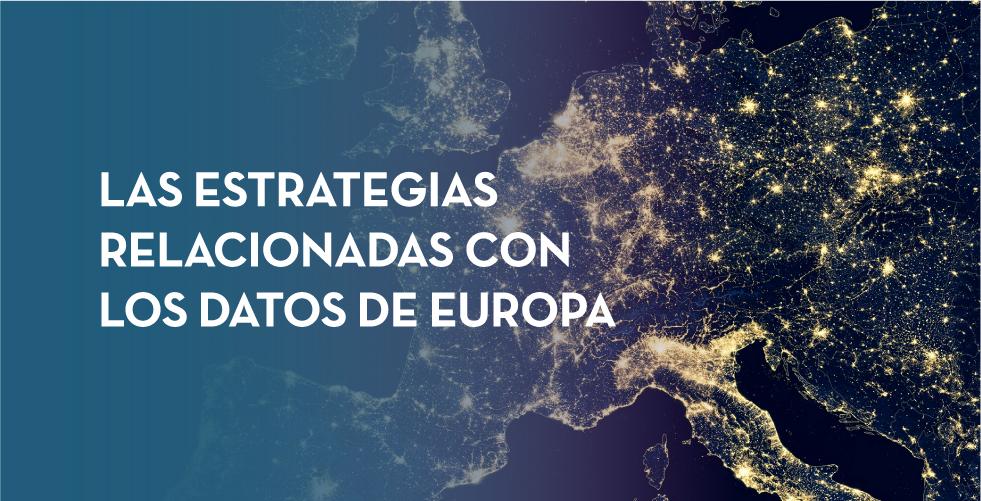
As a new year begins, it is time to take a look at the strategic, regulatory and political situation that will affect the world of open data in the coming months.
In this article we will focus on the situation in Europe. If you want to know the Spanish framework, you can read the article " The data strategies that will shape 2021 in Spain".
Europe stresses importance of data to drive recovery and innovation
After a 2020 marked by the global pandemic, 2021 is expected to be the year in which both health and economic recovery begins. In this sense, the European Commission considers data as a fundamental asset to overcome the crisis linked to COVID-19, and will therefore continue to promote its openness and reuse.
Already at the end of 2019, with the presentation of the European Green Deal, the Commission set out the roadmap to follow based on two pillars: digitisation and environmental sustainability. Among other issues, the Green Deal highlights the need to promote accessible and interoperable data, which, combined with digital infrastructure (supercomputers, cloud storage, ultrafast networks) and artificial intelligence solutions, facilitate informed decision-making.
Along the same lines is the white paper on Artificial Intelligence, published in February 2020 with the aim of ensuring an AI ecosystem of excellence and trust, based on regulation and investment. Among other issues, the document emphasises the need to ensure access to reusable data in accordance with the FAIR principles. This data must be comprehensive and representative in order to train AI systems and ensure their reliability.
Objectives and lines of action for 2021
The Commission's objectives for 2021 include boosting Europe's digital sovereignty, i.e. improving its competitiveness beyond its borders. To this end, it has established a European data strategy to drive the data economy and a digital single market, where data is shared between member states. This strategy will be accompanied by considerable investment, as the Recovery Plan for Europe, designed to help repair the economic and social damage caused by the pandemic, indicates that €143.4 billion will be allocated to the "Single Market, Innovation and Digital Economy".
This European data strategy is based on:
- A multi-sectoral data use and access governance framework. The proposal for a regulation of the European Parliament and of the Council on European data governance, published at the end of 2020. This regulation establishes a legally binding framework that provides mechanisms for the re-use of public sector data that usually cannot be exploited due to third party rights or personal data protection. The regulation facilitates the transfer of personal and business data for the common good, establishes the figure of neutral data sharing service providers, and obliges states to establish a single point of information, among other issues. This regulatory proposal is accompanied by an impact assessment that analyses the possible policies to be implemented in this area on the basis of their effectiveness, efficiency, coherence and legal and political feasibility. It states that "the general public is in favour of a comprehensive data strategy and the altruistic transfer of data, as well as the implementation of technical tools that allow citizens to actively participate in the data economy".
- This regulation complements the Directive on open data and re-use of public sector information, which extended the scope of Directive 2003/98/EC and its 2013 reform. During the first quarter of 2021, the implementing act on high-value databases, the re-use of which is associated with considerable benefits for society, the environment and the economy, is expected to be adopted, as set out in this directive.
- Boosting public-private collaboration and investments in data, capabilities and infrastructure, with a focus on data storage, cloud, 5G and interoperability. In this regard, one of the commission's major projects is the pan-European cloud federation. On 15 October, the relevant ministers made a joint declaration called 'Building the next generation cloud for businesses and the public sector in the EU' to combine private, national and EU investment in the deployment of competitive, green and secure cloud infrastructure and services. The main focus is on the deployment of European data spaces in sensitive areas such as health, industry or the environment to help overcome technical and legal obstacles. A first initiative in this field is GaiaX.
- The empowerment of people, and investment in SMEs and their training, through actions such as the new Connecting Europe Facility (CEF) grants or the Digital Education Action Plan (2021-2027), which among other actions proposes the development of ethical guidelines on artificial intelligence (AI) and the use of data. It also updates the European Digital Skills Framework, including AI and data-related skills, and support for the development of learning resources for schools.
Finally, other plans and strategies related more generally to data have also been approved during 2020, such as the European Strategy on Open Source Software 2020-2023, the Cybersecurity Strategy or the Berlin Declaration on the digital society and value-based digital governance.
With all these measures, the European Commission seeks to make data one of its priority axes, a valuable asset, which should be reusable, accessible with guarantees and serve as a basis for numerous economic and social activities.

If you want to know how these strategies, plans and regulations are reflected in Spain, we invite you to read the article " The data strategies that will shape 2021 in Spain".
You can see a summary of the data-related strategies that will mark 2021 in Europe and Spain in this link .